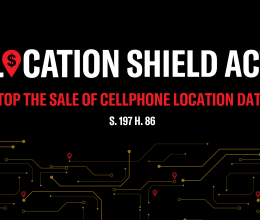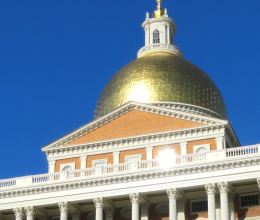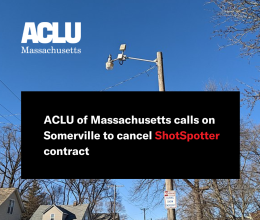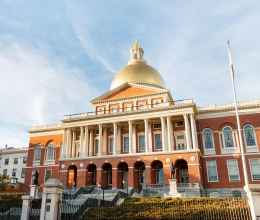
Blocking Face Surveillance in Boston
By Kade Crockford, director of the Technology for Liberty Project at the ACLU of Massachusetts
What if we were just one software update away from dystopia? What if suddenly, without any public debate, the government flipped the switch on a network of super-charged surveillance cameras that could create watchlists of people’s faces and track them automatically as they move through public spaces?
It’s a scenario that some elected officials in Boston are working right now to prevent. Last Wednesday, Boston City Councilors Michelle Wu and Ricardo Arroyo introduced two key surveillance oversight ordinances: one that would establish democratic control over new surveillance technologies acquired by the municipal government, and another that would ban face surveillance technology outright.
The reason for urgency? This week, a key government contract is up for renewal, and the details may have profound implications for the future of privacy in Boston and beyond.
Like most cities, Boston has a network of hundreds of municipal surveillance cameras, which are linked and administered by software that can analyze both live video feeds and historical footage. The cameras themselves don’t have to be all that complex—they just need to record clear video—but the cloud-based software can grow more powerful with each subsequent update, allowing for improved video analysis without the need for corresponding hardware upgrades. In other words, a camera could gain terrifying new features—like face surveillance—without looking any different to passersby.
That’s exactly what could happen to Boston’s municipal cameras—as soon as this week—if the city council doesn’t act quickly. According to records obtained by the ACLU of Massachusetts, the City of Boston has been using software called BriefCam to manage its surveillance camera network; last year, the city renewed its contract and upgraded from BriefCam version 4.2 to version 4.3. This contract—facilitated by a third-party vendor called LAN-TEL Communications—is due to expire tomorrow, May 14, and it’s likely that BriefCam will push the City to upgrade to the latest version, which includes some truly scary capabilities.
How scary? See for yourself in this promotional video that the company posted on YouTube.
Since version 5.3, released in 2018, BriefCam has allowed users not just to identify faces, but to create literal “watchlists,” setting up a system whereby anybody moving through a public space can be tracked automatically, without their knowledge. Add to that the ridiculous claims that other face surveillance companies are making for their technology and its supposed predictive capabilities, and we’re not far from a Minority Report world in which people are automatically flagged by computers as suspicious or even criminal. And this is all assuming that face surveillance is reliable or accurate when the opposite has been shown to be true. Face surveillance is dangerous when it works and—as is more often the case—when it doesn’t.
City officials might argue that they have no intention of using these new features or even updating to the new software version, but there are two crucial problems with that response. First, as the ACLU’s own investigations have shown, private tech companies are ruthless and unscrupulous in promoting their products, and unwitting public institutions can fall prey to these tactics. Clearview AI, the extremely shady company that scrapes the web for photos of ordinary people, notoriously gave out free trials of its face surveillance product to schools and police departments. In many cases—including in Massachusetts—curious employees ran face searches without their superiors knowing about it. And given the level of technical detail, city officials likely wouldn’t think twice about a simple software upgrade, especially if the company pressured them by threatening to phase out support for older versions. (BriefCam just announced version 5.6.)
Second, even if we trusted government officials not to use powerful and dangerous features newly at their fingertips, there is no oversight, and no way to hold bad actors accountable. Save for a growing number of cities and towns across the Commonwealth and in places like San Francisco that have banned face surveillance outright, there are virtually no laws or regulations anywhere in the country that provide oversight of government use of face surveillance technology. What makes Boston’s situation so concerning is not just that the technology is dystopian, but that it could be adopted so easily, with no public debate and no laws to establish even the most basic safeguards of our civil rights and civil liberties.
That’s why the ACLU is proud to work with the Boston City Council to pass these much-needed ordinances, so that we can ban face surveillance and Bostonians can assume democratic control over the city’s rapidly expanding surveillance apparatus. At a time when public trust is essential but tenuous, the last thing we need is to emulate authoritarian regimes like that of Moscow.
Privacy can’t protect itself. Take action and tell the City Council to ban face surveillance!
Related content


Legislative committee advances bill to modernize Open Meeting Law,...
June 24, 2024
ACLU applauds new landmark data privacy legislation
May 6, 2024
Virtual access to public meetings set to expire March 31, 2025
April 1, 2024
ACLU of Massachusetts calls on Somerville to cancel ShotSpotter...
March 14, 2024
Advocates criticize Municipal Empowerment Act’s approach to public...
February 27, 2024
Cellphone location data used to target abortion misinformation to...
February 13, 2024
Supreme Judicial Court rules that Hampden DA withheld exculpatory...
January 23, 2024